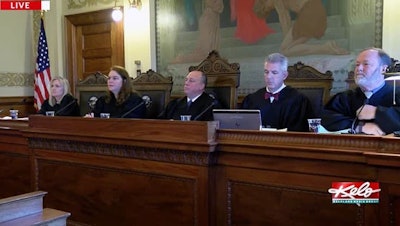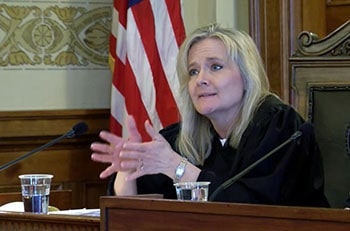
Adult-use cannabis legalization remains uncertain in South Dakota, where the state’s Supreme Court heard arguments April 28 on the constitutionality of a voter-approved amendment from the November 2020 election.
The court’s hearing stems from a lawsuit challenging the constitutionality of Amendment A, which passed with a 54.2% majority. The ballot measure read: “An amendment to the South Dakota Constitution to legalize, regulate and tax marijuana; and to require the legislature to pass laws regarding hemp as well as laws ensuring access to marijuana for medical use.”
The plaintiffs in that case argued that the measure violates the state’s one-subject rule and does not simply amend the state constitution but, rather, revises the constitution. Therefore, the revision would require a constitutional convention to be called for by a three-fourths vote of members from both chambers of the state legislature.
The defendants, who represent South Dakotans for Better Marijuana Laws, the group behind Amendment A, argued the measure contains one subject—cannabis—to which all provisions are essentially related. In addition, they argued the state constitution’s definitions of “amendment” and “revision” are permissive, not obligatory.

During the hearing in front of the five South Dakota Supreme Court justices on April 28, Brendan Johnson, an attorney in support of Amendment A, argued the state’s one-subject rule as it has been applied by the high court has historically serviced as a shield, not as a sword, he said.
“It is designed to shield the people from legislation, from crafty legislators, who before the legislation passes, they’ll insert … something that the people weren’t expecting,” Johnson said. “They would have no reason to expect that this could happen. That has been the purpose of this single-subject. Same when it comes to amendments.
“Is there something in the amendment that is so outlandish, so outside the bounds, that the people of South Dakota couldn’t possibly have known what it was that they were really voting for? That didn’t apply here in South Dakota. We had a vigorous debate—probably the most intensely scrutinized piece of legislation in my lifetime, in a generation, that the people ever voted on.”
Article XXIII of the South Dakota Constitution states: “No proposed amendment may embrace more than one subject. If more than one amendment is submitted at the same election, each amendment shall be so prepared and distinguished that it can be voted upon separately.”
The plaintiffs argued that Amendment A has five subjects, as it appeared on the ballot: legalizing cannabis, regulating cannabis, taxing cannabis, requiring the South Dakota Legislature to pass laws regarding hemp and ensuring access to medical cannabis.

In her opening remarks in front of the Supreme Court justices, Lisa Prostrollo, an attorney who argued in opposition of Amendment A, said the constitutionality of the voter-approved ballot measure is not a matter of legalizing cannabis.
“And it’s not about the multitude of other subjects that are packaged within Amendment A,” she said. “It’s about the rule of law, and it’s about enforcing the limitations that the people placed on their ballot initiative under the constitution. Those limitations are essential to preserving the integrity of our state’s founding documents. The circuit court recognized this when it struck down Amendment A, and we’re asking this court to do that same.”
RELATED: South Dakota Judge Strikes Down Adult-Use Amendment
On Amendment A, the South Dakota Supreme Court is considering a core filing that is 550 pages.
Justice Janine M. Kern said she counted 15 subjects and 55 subsections in the new article that Amendment A purports adding to the South Dakota Constitution. She asked about what she called the “far-reaching implications” of the article in regard to the state’s department of revenue’s “exclusive power” to enforce certain lawful functions, such as appropriating tax revenue gained through the implementation of an adult-use cannabis program.
“I’d like you to address that concept,” she said to Johnson.
“Of course, the number of provisions has always been less important than what the provisions themselves do,” Johnson said. “When it comes to the exclusive power of the department of revenue, you’re going to hear a lot about that. So, the language here is extremely important.”
Regarding the authority that would be granted to the state’s department of revenue, the article that would be added to the constitution states, “The department shall have the exclusive power … to license and regulate the cultivation, manufacture, testing, transport, delivery, and sale of marijuana in the state and to administer and enforce this article.”
Johnson said that language involves a simple delegation of power.
“That is not revolutionary, in all due respect to opposing counsel,” he said. “What we see every year in this legislature is that they will delegate powers to a different agency. When we talk about the exclusive power of the department of revenue, it means that they’re not sharing it with the department of health, which they might do in the situation of medicinal marijuana.”
In a rebuttal, Prostrollo said that delegation of power as written in the article is not simple but is unique as it applies to South Dakota. Granting the department of revenue exclusive authority to enforce certain lawful functions would affect South Dakota Highway Patrol Col. Rick Miller and the rest of the highway patrol, she said.
The entire case being argued in front of the Supreme Court on April 28 stemmed from Miller and Pennington County Sheriff Kevin Thom, who filed a lawsuit Nov. 24 that challenged Amendment A, arguing it violates the state’s one-subject rule.
Under South Dakota’s current system of government, the highway patrol has been granted or delegated authority to enforce all laws on state highways—an authority that the state legislature delegated—but if Amendment A is enacted, suddenly that authority shifts to the department of revenue, Prostrollo said.
Justice Mark E. Salter questioned that perspective as it relates to the constitutionality of Amendment A.
“Isn’t that the nature of an amendment, that the people through their vote could do something different—tell the legislature we want a different rule?” he said. “The highway patrol’s cognizance over whatever it has cognizance over at this point surely isn’t constitutionally based.”
It is constitutionally based, Prostrollo said.
“It is?” Salter asked.
Amendment A should in fact be considered a revision, Prostrollo said.
“Under our current constitution, we have three branches of government that are afforded specific delegated powers,” she said. “Amendment A changes that. It elevates the department of revenue to effectively a fourth branch of government with exclusive power. That’s a fundamental change to the basic structure of our constitution and our system of government. That makes Amendment A unlike any other amendment that this state has ever seen, and it’s the reason this court should strike it down today.”
Another key component surrounding Amendment A discussed during the hearing included the opposition’s silence to challenging the ballot initiative before the election.
Johnson acknowledged that Amendment A is a lengthy amendment that was crafted through studying legislation from other states, including constitutional amendments, and streamlined some of those previously established legalization efforts, he said.

Justice Patricia J. DeVaney asked if other states on which Amendment A was modeled also submitted their measures all as one amendment. Johnson said he’d have to double-check before providing a definitive answer.
“Colorado also has a single-subject rule, which is similar to South Dakota’s,” Johnson said. “So, that’s [part of] what we patterned it after.”
The first state to pass an adult-use cannabis legalization measure, Colorado voters approved Amendment 64 by approximately a 55% majority in the November 2012 election.
Amendment 64’s specific language on the 2012 ballot was as follows: “Shall there be an amendment to the Colorado Constitution concerning marijuana, and, in connection therewith, providing for the regulation of marijuana; permitting a person 21 years of age or older to consume or possess limited amounts of marijuana; providing for the licensing of cultivation facilities, product manufacturing facilities, testing facilities, and retail stores; permitting local governments to regulate or prohibit such facilities; requiring the general assembly to enact an excise tax to be levied upon wholesale sales of marijuana; requiring that the first $40 million in revenue raised annually by such tax be credited to the public school capital construction assistance fund; and requiring the general assembly to enact legislation governing the cultivation, processing, and sale of industrial hemp?”
Johnson said the critical issue for South Dakota’s voter-approved Amendment A is: Was it done constitutionally and lawfully?
The answer is “yes,” Johnson said.
“Did we have the requisite number of signatures? Absolutely did,” he said. “Did we get them in time? Absolutely did. Did we violate the single-subject rule? We did not.”
The South Dakota Constitution does not restrict the scope or magnitude of the single subject of a legislative act, Johnson said.
“Fifty-five sections is a lot,” he said. “But is it part of a singular scheme, where we are taking cannabis, which has been illegal, and legalizing it? I would say that it is.”
If opponents of Amendment A had a constitutionality issue with how it appeared on the ballot, Chief Justice R. Jensen questioned why those opponents did not file litigation to challenge the voter initiative before the election.
“You’ve got this issue with, ‘We don’t think that this is properly in front of the voters, and we want to challenge it. The secretary of state shouldn’t put this on the ballot,’” Jensen said. “Is there a reason that couldn’t have been brought before the election, before the people voted on this, and the court could have decided the one-subject issue before the people voted?”
The initiative petition was received by South Dakota Secretary of State Steve Barnett on Aug. 15, 2019—more than a year before the election.
There was no straightforward procedure for bringing an action before the election, Prostrollo said.
“Thankfully, the legislature has now addressed that, so it won’t be a problem moving forward,” she said. “But there was a question at the time. And in fact, this court has stated that when a case is deciding whether a change in the constitution has been legally affected, that question is actually better addressed after the election.”
If attorneys representing opponents of any ballot amendment were to bring challenges to court before an election, and then voters struck down and defeated such an initiative at the polls, that would be a waste of judicial resources, Prostrollo said.
While it’s clear that voters can change the constitution when they want to, and when they follow the rules, the substantive legality of Amendment A is not an issue, Salter said from behind the bench. Rather, what’s at issue are the technical requirements posed by the constitution for presenting an amendment in the first place, and whether the correct procedure was utilized, he said.
Going back to the one-subject rule, Johnson said it’s OK for voters to have multiple reasons for supporting a ballot initiative—such as voting in favor of legalizing adult-use cannabis and ensuring access to medicinal cannabis—on the same ticket. What’s not OK is if the ballot initiative buried something that somehow voters would have been tricked or fooled into supporting, he said. That did not happen with Amendment A, he said.
“When we talk about the damage that could be done,” Johnson said, “if that for the first time in our state’s history we have a court that literally throws out 417,000 votes that were cast on a piece of legislation passed by the people, the harm that that could do, especially in a time that [many] people feel like elections are rigged anyhow, the standard should be exceptionally high.”

























